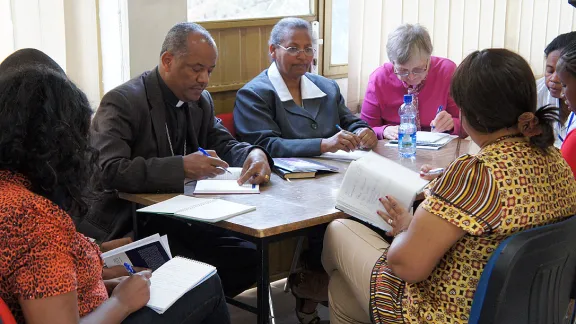
Rev. Dr Wakseyoum Idosa Negeri, president of EECMY, in discussion at the Gender Justice Policy workshop in Ethiopia, Feb. 2014. Photo: LWF/Elaine Neuenfeldt
Workshop Discusses Action Plans for the Church
(LWI) – A four-day workshop with African participants in Addis Ababa, Ethiopia marked the beginning of the Gender Justice Policy (GJP) implementation process. The Gender Justice Policy, approved by the Council of The Lutheran World Federation (LWF) in 2013, is a tool to enhance the communion’s journey towards inclusiveness, to promote equality and balanced power relations between women and men. Now, the process has moved on to apply policy to practice.
The workshop which is a collaborative initiative of LWF Departments for Mission and Development (DMD) and Theology and Public Witness (DTPW) is the first of many such events, planned in all regions. It addressed how to methodically introduce gender on the programmatic level and which structural changes are required in order to introduce gender justice in all aspects of church life. It also provided a platform to discuss the LWF Gender Justice Policy in relation to the experiences on the ground.
Institutional Commitment
“Issues of gender need to be seen from the perspective of doing justice,” said EECMY president Rev. Dr Wakseyoum Idosa, in his opening speech at the workshop. “To know God for us is not merely to worship God. It is not complying with certain doctrine and principle that we follow in our churches. It is an act of each one of us on behalf of us and our neighbors to seek for justice and righteousness to reign and flourish.”
Judith Nyaata was one of the participants in the workshop, which included men and women, ordained and lay persons, theologians and diaconal workers from the South African region. She is the project coordinator of “Say no to FGM (Female Genital Mutilation)”, a program run by the Evangelical Lutheran Church in Kenya (ELCK) which is supported by The Lutheran World Federation (LWF). Her work is one of the many contexts where the LWF Gender Justice Policy will be implemented. The project is a women’s initiative and yet, Nyaata knows that in working with women alone, they will not be effective.
Action Plans for Different Contexts
Part of the time was dedicated for the sharing of experiences and knowledge regarding mainstreaming gender and women’s empowerment in programs set up by the LWF Department for World Service (DWS), projects supported by LWF and the Ethiopian Evangelical Church Mekane Yesus (EECMY) women’s department and the church’s Development and Social Services Commission – DASSC. The workshop also included discussion on the gender justice policy and theological studies on gender justice and worship.
“There is a need to address the ownership related to gender,” Rev. Dr Elaine Neuenfeldt, LWF Secretary for Women in Church and Society (WICAS) explained. “Issues and projects related to gender have become almost purely women’s issues, while the decision-making spaces and forums are still lacking the presence and participation of women. The goal of the implementation process is to design action plans which fit the context in which people live,”
Neuenfeldt pled for a different approach in women’s empowerment, using gender justice as theological and biblical grounding. “There is a necessary shift to be done, putting emphasis on changing the attitudes, organizations and structures. It is about transformation and full participation,” she said.
Include All Aspects of Church Life
Therefore the group shaped practical recommendations for implementing gender justice in programmatic work. It was agreed that the Gender Justice Policy needs to be used, studied, translated and made relevant for the different global contexts. For effective management of human and financial resources, there is a need for continuous collaboration and engagement between all departments in the church, the group said.
The workshop participants also recommended that there needs to be intentional effort from the church leadership to fully integrate women in the ordained ministry, and in all levels of decision making of the church. Participants called on church leadership to ensure that there are appropriate structures and staff trained for the purpose.
As the church is an important moral institution in African countries, workshop participants believe that it is an important agent to advocating gender justice. They recommended to involve church leadership in order to achieve an effective result on how to develop structures which incorporate gender as a crosscutting priority.


